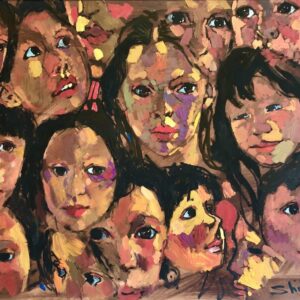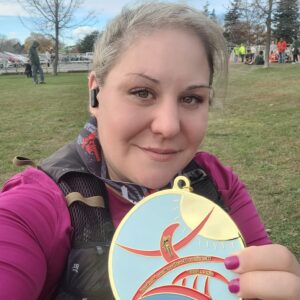
As an intergenerational survivor with children of my own, I know it is possible to go through a great deal of pain and come out on the other side with hope, social and academic competence, and joy. My children received the opportunities and gifts my mother and I were not able to experience. They had what many would call a “normal” childhood with two parents, albeit ultimately divorced, but together during their youngest years and still present in their lives.
My mother spent eight years in Shingwauk Indian Residential School (IRS) with her siblings, and there they were denied the simple reality of a loving touch, a maternal smile and a paternal hug. They did not come out of there with healthy attitudes or behaviours, and when you know the story of IRS, you know why. However, like many direct survivors, they did their best with what they had and they ensured their children had clothing, food, and a roof over their heads like every other good parent in this country. The missing things were hugs, parental pride, whispered I love you’s, weekend play dates and family time. They didn’t know how important those things were because they didn’t have them once they were taken from their parents and raised by nuns and priests who never had children of their own.
My mom wasn’t huggy, but she sewed like a champ, taught me all about consequences, and she made me laugh. We laughed a lot in between the pain of domestic violence and the all too familiar partying she did with her peer group. She married another survivor, and he had spent twelve long years in the same school. He came out of there swinging and he never stopped until cancer stopped him. But, we all eventually learned forgiveness, and while none of us ever forgot, we moved on and made peace. It was that “Indian sense of humour” that made my mom the special lady she was, and everyone remembers her for that and her incredible wit. I think all of her sisters had that wit in equal measure, and they made the house rock with laughter when they all came together.
She made a great “gramma” too, after she came to understand her own past, and forgave herself for her own role in making my young life chaotic. She never believed the stories I told her of sexual violence, and while never raped, I had a lot of sexual experiences from her friends and family that deeply influenced my perception of myself, and the choices I made when I was young. She finally believed me when I began to teach and work with personal and community healing and had to tell my story to others. She fought the truth, but in the end she made amends by going to speak to those men she knew and giving them hell. Thanks for that mom. She died at 75 years old, and by that time we had not only made peace, we had learned to hug each other and say “I love you” right out loud and often.
My daughters benefitted from the choices I made as a parent, I nursed them, twin girls, for two years. I took them everywhere and I listened to them. I followed their lead when they were frightened and I believed them when they spoke. Since I developed hyper-vigilance as a child I used that to protect them and I still use it today to stay tuned to my environment. It was a gift out of the chaos of an IRS legacy. My mom became the grandmother she never had growing up with strangers. She said the biggest loss in her own life was not knowing her parents, so she made sure my girls knew her very well, and they were her biggest achievement. She sure knew how to show and say I love you to them, and it shows in their own ability to love.
Even though I dropped out of school at 16 years old, I returned and completed my high school education at 23. Today, at 58 years old I have a Masters Degree and a Ph.D. in Anthropology from the University of Toronto. My girls are doing well, and although we miss the wit and laughter my mom gifted us with, we have good lives. I now hold the position of Vice Provost (Aboriginal Initiatives) at Lakehead University in NW Ontario and have dedicated the rest of my career to ensuring the children of Nishnawbe Aski have the education and encouragement they need to succeed and rebuild their First Nation communities. This is my return of the gift they gave me when they allowed me the privilege of living amongst them in 2000-2001 to complete my doctoral research on the effects of Intergenerational Trauma on Indigenous Populations. They are an incredibly gracious people and I am eternally grateful.
What does my life look like as an intergenerational survivor? Fabulous, and I can confirm unequivocally, there are many more just like me, with amazing lives, happy families, well educated children, and goals and dreams just like everyone else. We will reconstitute our cultures and languages and we will prevail, because the laughter, the wit, and the sheer determination running through our veins and our Nations will ensure it. Yes, there are still people in pain; there will always be struggles, and a deep respect for those who are still striving for happiness. My hands and my heart are extended to you, for you and I are one. We will carry the gift of being indigenous into the future, and we will survive.
Dr. Cynthia Wesley-Esquimaux is a member of the Chippewas of Georgina Island First Nation. She the Vice-Provost (Aboriginal Initiatives) at Lakehead University in Thunder Bay, Ontario. She has been a leader in indigenous post-secondary education at the Banff Centre, University of Toronto and Carleton University. She is the former Advisory Member of the Mental Health Commission of Canada. Her academic work has focused on understanding Historic and Intergenerational Trauma in Indigenous communities.






